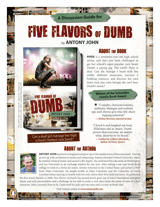

Let’s start with technical accuracy in portraying deafness.

If you want analysis, this is where I get into that. Despite some flaws, it is clear the author did his research. If you’re just reading this review to know if there is a deaf/Deaf reader who is comfortable recommending this book as being largely free of stereotypes and other problematic representation, then here’s my short answer: Yes. But the dynamics are also much influenced by Piper being an ordinary adolescent figuring out who she wants to be as she emerges into adulthood. The dynamics of how this plays out in the story is much influenced by Piper being deaf and her family hearing. In the midst of all the drama involving “her” band, Piper also is figuring out how she wants to relate to her parents and her two siblings. Struggles, not because she is deaf, but because the band is comprised of members who do not always get along well. In the story, Piper struggles to manage a new high school hard rock band called “Dumb”. In these ways (apart from the chess) she is like me if you subtract a quarter century from my age. She’s smart, academically successful, mainstreamed at a public high school, a wicked good chess player, and interested in attending Gallaudet University in part so she can finally be among other deaf signers like her. The protagonist, Piper Vaughan, is a young deaf woman finishing her last year of high school. If you understand how badly disabled readers need to meet ourselves in a book, and if you also understand how often we’ve been betrayed, then perhaps you’ll understand the mingled excitement and trepidation with which I approached the task of reading Five Flavors of Dumb by Antony John. As if either our bodies or our spirits were automatically broken or twisted just because we are people with disabilities. As if our bodies belonged to them to use as metaphor.

Afraid to feel betrayed-again-by an author only interested in using disability as a metaphor for “broken” or “twisted” spirits. Afraid to invest my hope in finding characters I like only to feel betrayed-again-to find that the character most like me is just there as a prop for another character’s personal growth. On the rare occasions that I stumble across a book featuring a disabled character while browsing, I gravitate to it.īut I also feel afraid.


 0 kommentar(er)
0 kommentar(er)
